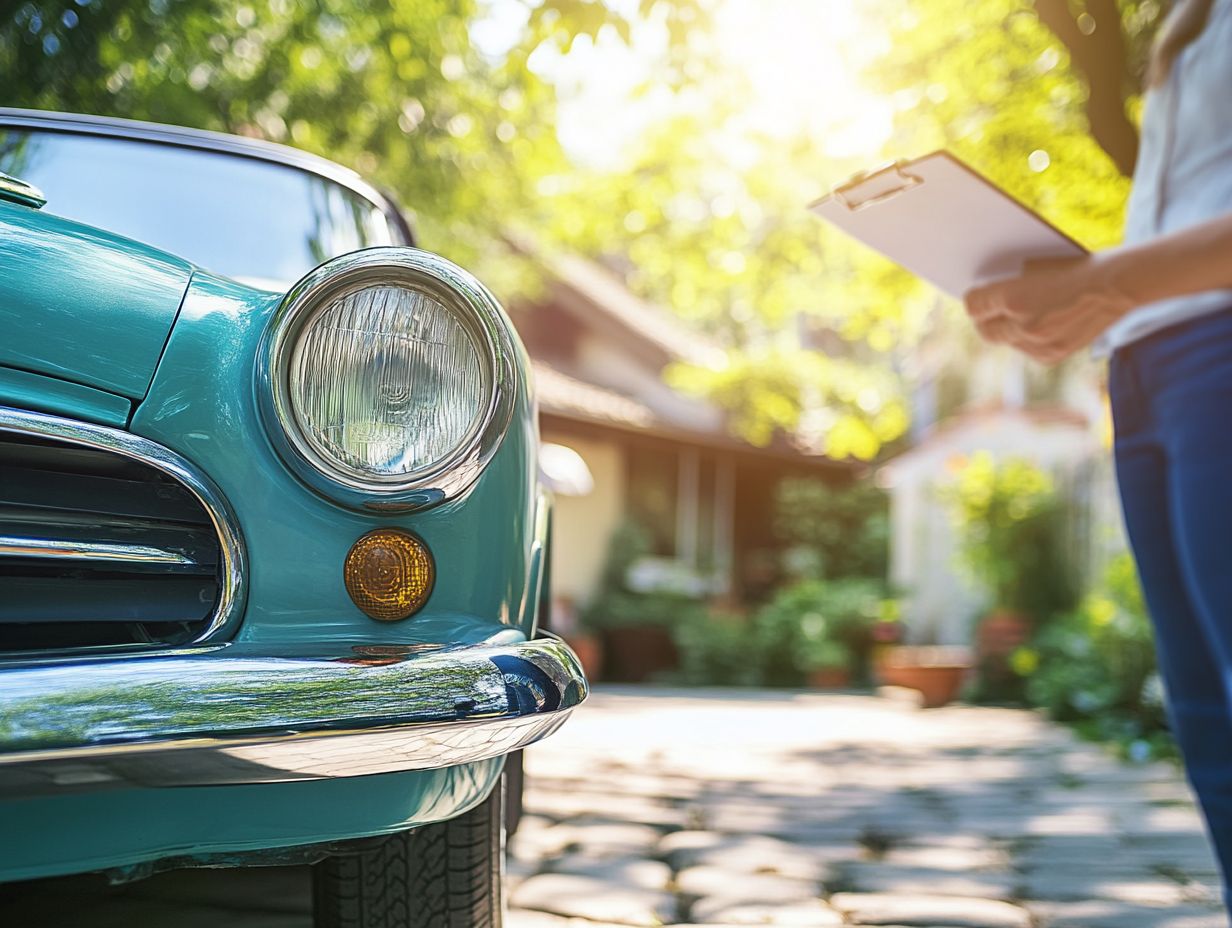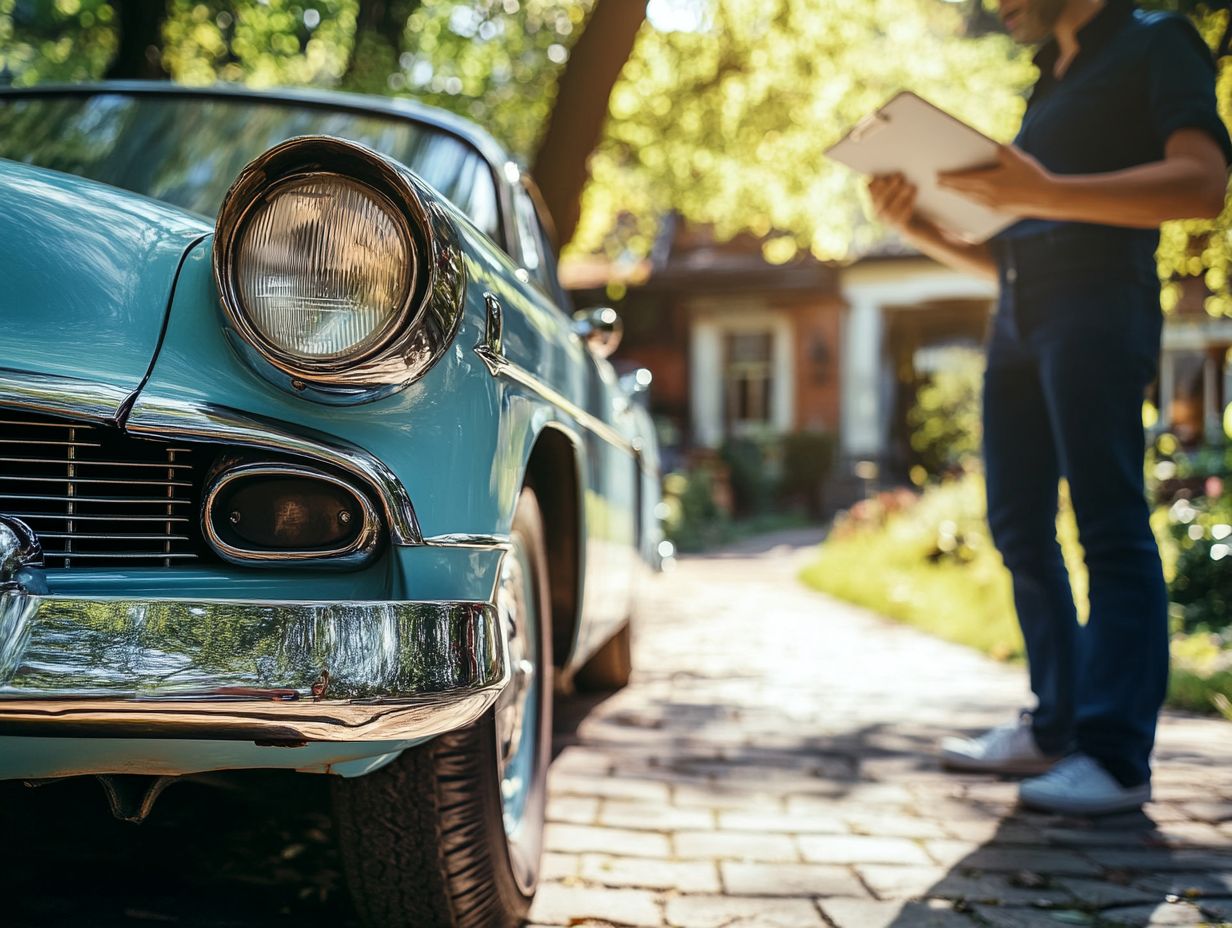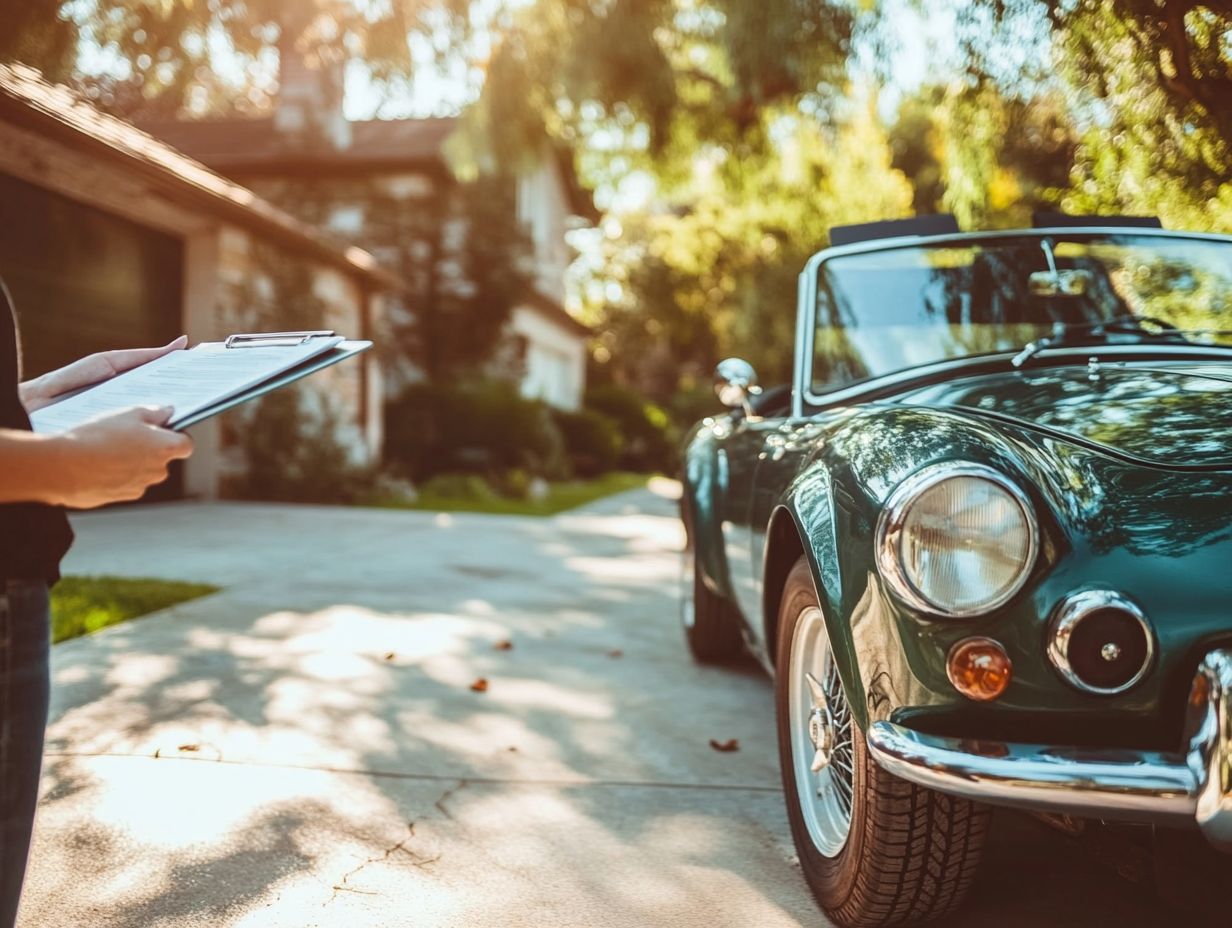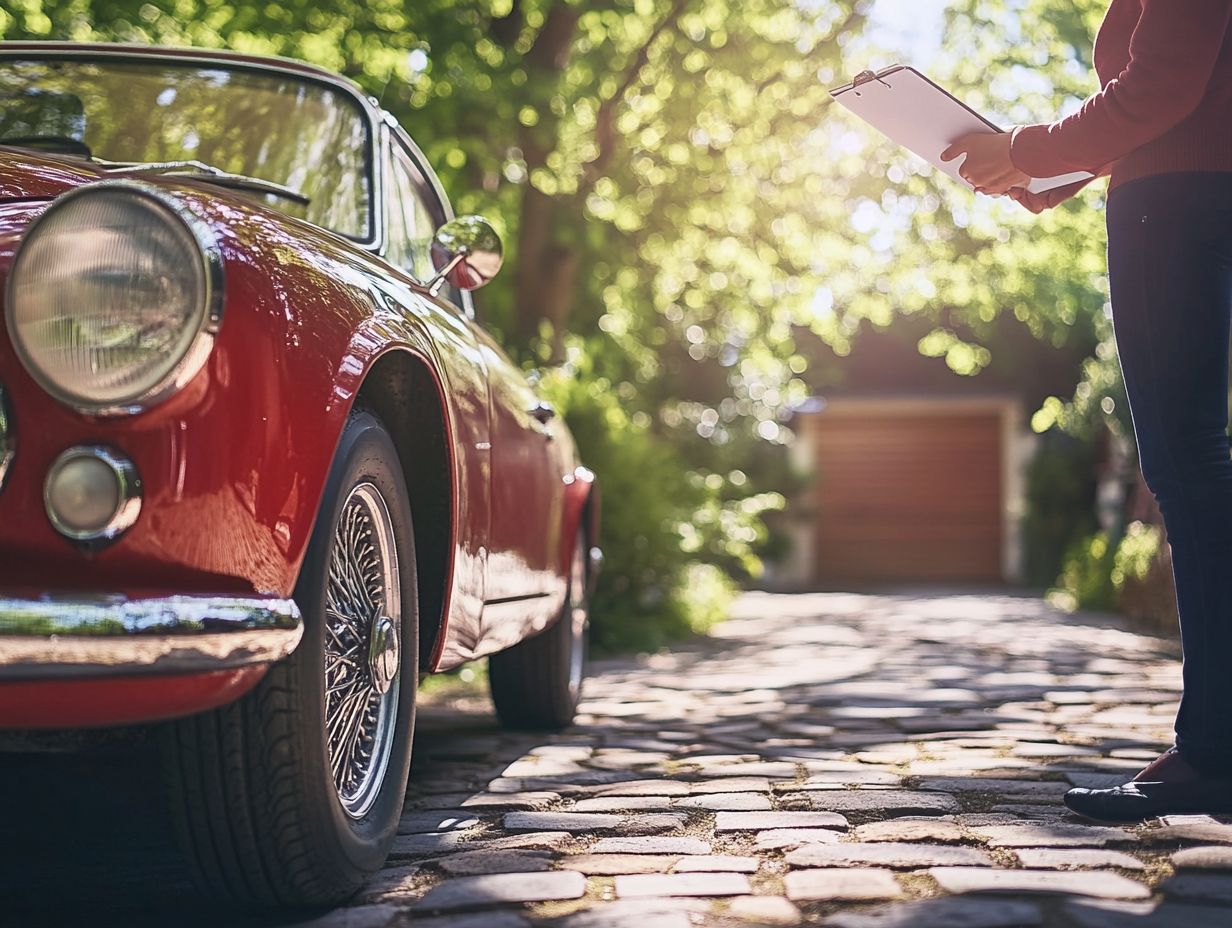Do I Need Insurance for a Classic Car?
Classic cars occupy a cherished spot in the hearts of enthusiasts. They seamlessly blend history, beauty, and exceptional craftsmanship.
Getting insurance for these amazing cars can be tricky. What truly qualifies as a “classic”? What advantages come with specialized classic car insurance?
This guide explores classic car insurance. We ll discuss what defines a classic car, factors influencing insurance rates, and alternative options to traditional coverage.
Whether you’re a seasoned collector or just starting your journey as an owner, this information equips you with the knowledge to safeguard your prized possession.
Contents
- Key Takeaways:
- Understanding Classic Car Insurance
- Benefits of Classic Car Insurance
- Factors that Affect Classic Car Insurance Rates
- How to Get Classic Car Insurance
- Frequently Asked Questions
- Do I Need Insurance for a Classic Car?
- What type of insurance do I need for a classic car?
- Is classic car insurance more expensive than regular car insurance?
- What factors affect the cost of classic car insurance?
- Do I need to appraise my classic car for insurance?
- Can I use my regular car insurance for my classic car?
Key Takeaways:

Understanding Classic Car Insurance
Understanding classic car insurance is essential for enthusiasts like you. If you love vintage and antique vehicles, this type of insurance significantly differs from regular auto coverage.
Standard auto insurance is designed for everyday drivers. Classic car insurance offers specialized options that consider the value and historical significance of your vehicles.
Reputable insurers like State Farm, Hagerty, and American Collectors Insurance provide policies specifically for classic cars. These often include mileage limits and total loss claims, ensuring you receive the full value of your vehicle if the worst happens.
What Makes a Car a ‘Classic’?
A car typically earns the title of ‘classic’ when it has unique historical significance, rarity, and timeless design. These vehicles are often categorized as classic, vintage, or antique cars.
To determine if a vehicle belongs to these categories, you consider specific criteria. Classic cars are generally at least 20 years old, while vintage cars were produced between 1919 and 1930.
Design is key; an iconic aesthetic from a reputable manufacturer boosts desirability. Market demand also influences classification, with certain models coveted due to trends or historical importance.
If you own one of these treasured automobiles, securing an insurance policy is crucial. This protects your investment and helps preserve the legacy of these remarkable vehicles for generations.
Benefits of Classic Car Insurance
Classic car insurance offers a host of advantages tailored to vintage and antique car owners. This specialized coverage provides lower premiums and enhanced protection.
Coverage for Unique Needs
Coverage options in classic car insurance are designed to meet your needs as an owner. You ll receive the right protection through specialty insurance.
This insurance often features agreed value coverage. Here, you can set how much your classic car is worth, unlike standard policies that cover actual cash value.
For many collectors, total loss claims are crucial. They provide the financial support needed in the unfortunate event of damage or theft.
By opting for specialty insurance, you gain peace of mind. If the worst happens, you’ll have the means to restore or replace your beloved vehicle without facing financial setbacks.
Lower Premiums

One of the standout benefits of classic car insurance is the potential for significantly lower premiums. These can be much more affordable compared to traditional auto insurance. This affordability is largely due to the rules set by insurance companies.
These rules often include mileage limits, restricting how much you can drive the vehicle each year, typically between 1,000 and 5,000 miles. Limited use reduces the likelihood of accidents, presenting a lower risk profile to insurers. For example, companies like Hagerty may provide specialized policies that offer discounts for low-mileage usage. Grundy evaluates the appreciation in value and limited driving habits of classic cars to set rates that work in your favor.
The age and rarity of your vehicle can also lead to more savings, making classic car ownership not just a passion project, but a financially savvy decision.
Factors that Affect Classic Car Insurance Rates
Several key factors will significantly influence your classic car insurance rates. These include the age and condition of your vehicle, your driving habits, and the specific mileage limits associated with the insurance policy you choose.
Understanding these elements can help you make informed decisions and secure the best coverage for your prized possession.
Age and Condition of the Car
The age and condition of a classic car are crucial in shaping your insurance rates. Newer models often have different valuation metrics compared to older, antique cars.
Insurance companies typically assess the exterior and interior conditions, how well the car runs, and any restoration work that has been carried out. For example, a meticulously restored 1965 Ford Mustang will likely command significantly higher insurance premiums than a similar model that retains its original, albeit more worn, state.
The historical significance of the vehicle also plays a key role in its value. A rare 1957 Chevrolet Bel Air in pristine condition could attract higher coverage limits compared to a more common vintage model.
Previous accidents or modifications can also impact your overall costs, as insurers strive to accurately evaluate both risk and value.
Driving Habits and Mileage
Driving habits and mileage play a significant role in classic car insurance, as insurers take into account how often you use your vehicle when determining rates.
For classic car enthusiasts like yourself, maintaining good driving habits is not just about preserving your vehicle’s value; it can also lead to more favorable insurance premiums. When you use your vintage vehicle sparingly perhaps for events like car shows or leisurely weekend drives insurers often reward these limited driving patterns with reduced rates.
Conversely, if you frequently take your classic car out for everyday errands, you may face increased premiums due to a heightened risk assessment. This highlights the importance of being mindful of your driving habits, as they directly impact the affordability and availability of your insurance options.
How to Get Classic Car Insurance
Securing classic car insurance involves grasping the specific eligibility criteria established by insurers. Collaborate with experienced agents who specialize in collector vehicles. By doing so, you ensure that your prized possession is adequately protected. Don t wait! Secure your classic car insurance today to protect your investment.
Where to Look and What to Consider

When you’re on the hunt for classic car insurance, it s crucial to explore various insurance companies that focus on coverage for collector vehicles.
This means taking the time to understand your classic car’s special needs considering its value, rarity, and how you plan to use it while also evaluating how different providers can cater to those requirements.
Key factors to look into include the range of coverage options each insurer provides and the premiums tied to those plans.
Great customer service can make your experience smooth and stress-free! Reputable insurers like State Farm, Hagerty, and American Collectors Insurance stand out for their tailored policies and specialized knowledge in classic cars, offering features that make them worthy of your consideration in the marketplace.
Alternatives to Classic Car Insurance
While classic car insurance is tailored specifically for collector vehicles, you may find alternative options available that also offer protection for your antique and vintage cars.
Other Options for Protecting Your Vehicle
For collectors like you exploring alternatives, consider protecting your vintage car with commercial auto insurance or specialized policies that deviate from the usual classic car insurance.
These alternatives can be particularly advantageous, especially if you use your collectible vehicles for business purposes, offering coverage that adjusts to both personal and professional use.
For example, commercial auto insurance typically provides higher liability limits and can encompass a variety of business-related activities. This is ideal for classic car owners who might transport their vehicles to shows or exhibitions.
Specialized policies often include features specifically designed for classic cars, such as agreed value coverage. This means the insurance company agrees to pay a specific amount if your car is totaled, safeguarding the vehicle’s appreciated value at the time of the policy instead of its depreciated worth.
Knowing when to pursue these alternatives especially for those who frequently engage their cars in non-traditional capacities can significantly enhance both protection and peace of mind.
Frequently Asked Questions
Do I Need Insurance for a Classic Car?
Yes, it is highly recommended to have insurance for a classic car in case of any unforeseen circumstances such as accidents, theft, or damage. For more information on how to get insurance for a classic car, consider exploring your options.
What type of insurance do I need for a classic car?

The type of insurance you need for a classic car is known as classic car insurance coverage. It is specifically designed for older and collectible vehicles.
Is classic car insurance more expensive than regular car insurance?
Generally, classic car insurance can be more affordable than regular car insurance as it takes into account the lower mileage and usage of classic cars.
What factors affect the cost of classic car insurance?
- The age and condition of the vehicle
- The driver’s age and driving record
- The usage of the car (such as for shows or everyday use)
Do I need to appraise my classic car for insurance?
Yes, it is recommended to get your classic car appraised by a professional to determine its true value for insurance purposes.
Can I use my regular car insurance for my classic car?
No, regular car insurance is not sufficient for a classic car. It may not provide enough coverage for the unique needs of a collector vehicle.
Get your classic car appraised today to ensure you have the right coverage!






